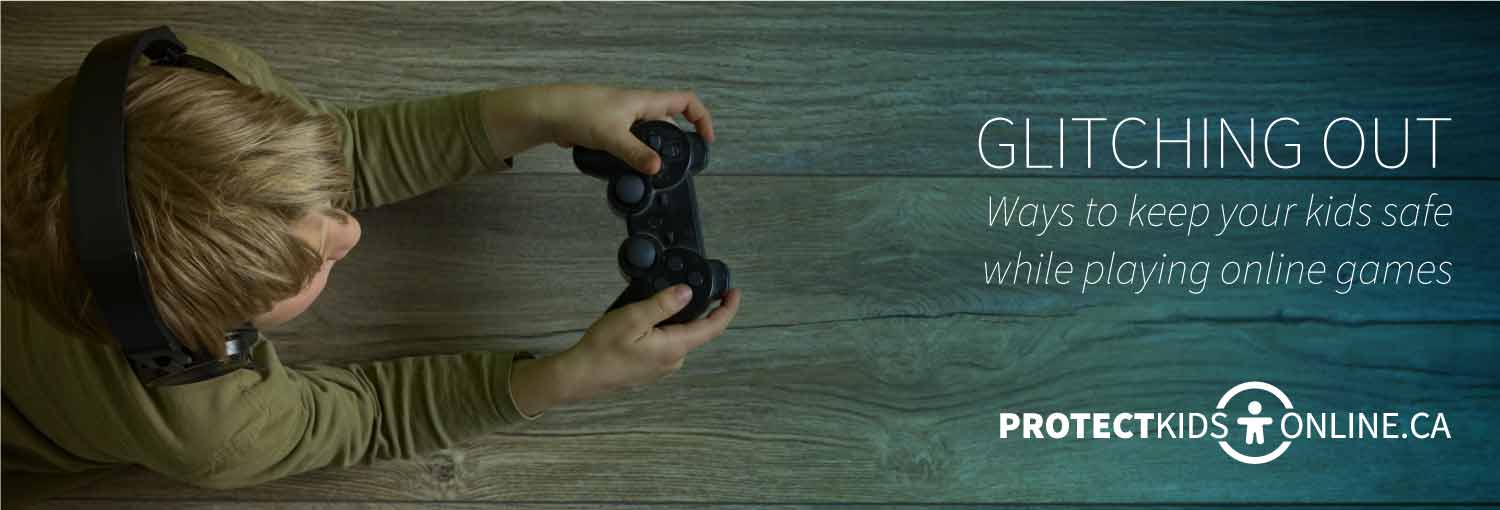Glitching Out
Ways to keep your kids safe while playing online games

Whether it’s splattering ink or building clans, online games provide a fun distraction for kids and are another avenue to connect with friends. Online games can be played through a console, downloaded as an app for mobile devices, or played directly on social networks. Whatever the format sometimes it’s not always fun and games.
Online games can pose safety risks for children and teens ranging from large bills to bullying. Here are some of the issues and how parents can help combat them:
Issue: A Large Credit Card Bill

Last year, a father of a Pembroke, Ontario teen was shocked when he received an $8,000 bill in Xbox® charges. Seems his 17-year-old was unknowingly purchasing more plays and packages within a popular soccer game.1
And this isn’t just a one-time, one-kid mistake. A recent poll of 1,534 Canadians by the Angus Reid Institute revealed one in seven Canadians experience children buying things they weren’t supposed to via a mobile device. Heck, even Kanye West turned to Twitter® to rant about in-app purchases within kids games.
“Freemium” games are apps that are free to play, but offer the ability to pay for in-game benefits such as gems or coins the user can buy to speed up play or gain access to new character outfits or levels. Often, kids don’t understand they are in fact paying with real money that’s usually tied to their parent’s credit card.
With gaming consoles, such as the Xbox, parental controls can be enabled to regulate what kinds of apps each user may download/purchase (it can range from blocking all downloads or just allowing free apps). Additionally, parents can set up a profile for their child without a credit card attached to that account (or just remove your credit card from the current account).
On mobile devices restrictions can be put in place under settings to prevent unintentional or unauthorized purchases. Steps for the iPhone® can be read here, while Android® uses can get help here.
Issue: Inappropriate Content

Freemium games have also been noted to have pop-up ads, links, and suggested videos/games during game play. These can lead children to inappropriate content (i.e., violent games, mature websites) with a few misplaced clicks.
The best way for parents to prevent this from happening is to supervise their child when they are playing games online, but it’s also important to teach your child not to click on advertisements in the game. This may require you to show them what they can click on (parts of the game) and what they shouldn’t click on (advertisements).
For tweens and teens, set up parental controls, and use filtering software to help ensure inappropriate content is blocked or inaccessible. But, don’t rely solely on these settings alone as parental controls on does not guarantee completely safe viewing. Do periodic check-ins to ensure settings are still in place and what your tween/teen may be viewing.
It’s also a good idea to talk openly with your teen about the hidden negative messages in media (e.g., gender stereotypes and the glorification of violence, sexual harm, power, and control) and that it’s not reality and doesn’t portray healthy relationships.
Issue: Cyberbullying

According to a 2017 survey conducted by Ditch The Label, a UK based anti-bullying charity, one in two people have been bullied by other players during an online gaming session. The study also found 64% of survey respondents, who ranged from 12–25 years old, have been trolled (defined as “behaviour used to deliberately annoy other users”), 57% had been subjected to hate speech, and 47% had received threats from other users. One user stated, “If I’m playing a game and I score a goal, I’ve literally been told to kill myself…”
Cyberbullying is a form of bullying that takes place through the use of computers, phones and other devices. It is abusive, deliberate, and repeated behaviour intended to harm another person. And unlike face-to-face bullying, cyberbullying doesn’t take a break – kids can be reached with hurtful messages any time of day.
For younger children, adjusting privacy settings or disabling chat functions on gaming consoles and in apps can help control unwanted messages. For tweens and teens who like to have a little banter with their buddies during a game session, ensure you know who they are talking to and discuss not accepting friend requests/chats if they don’t know the person in real life.
Should your child find themselves the subject of a mean message from someone online, explain the following:
- Take back your control – don’t answer them. It is hard not to write back when you’re sent a mean message because you want to defend yourself. This could make things worse.
- Keep it; don’t delete it. Save a copy of the message so you can show an adult what the person sent you.
- Talk to a safe adult. Talk to an adult who can support you and help stop what is going on.
- Block the person. Together with a safe adult, block and remove the person from your “friends” contacts on social networking sites.
- Report it. If mean messages are sent to you again, keep telling your safe adult who can help you report it. Everyone deserves to be safe and treated with respect.
Issue: Online Luring

Hurtful words within games are just some of the dangerous chatter that can happen. Individuals seeking access to children for a sexual purpose may connect with kids/youth through online games and apps that have a chat and/or video chat capability.
According to Cybertip.ca, the national tipline for reporting child sexual exploitation, in 2017 the tipline received 45 reports regarding online games with 22% of those classified as cases of luring, and 75% in need of being forwarded to police. In fact, earlier this year the Canadian Centre for Child Protection released a Cybertip.ca Alert regarding the popular multi-player website Roblox after receiving reports concerning requests to meet up in person, and/or sexually suggestive chat messages being sent to children under the age of 12 within the game.
It’s good to remind your child/youth that opponents online are not necessarily who they say they are and not to believe everything a person tells them online. Also, never share personal information, such as passwords, school name, etc. or photos with people they play games against.
Explain if someone in a game wants them to move to video chatting sites or other chat platforms they need to come to you for permission to be safe, and that youth should never meet in person with someone they’ve first met in a game without a parent or guardian present.
And, for all ages of children and youth, discuss trusting their instincts. If a conversation or situation online makes them feel weird, log off, and talk to a safe adult about what happened.
What Else Can You Do?

There are several more steps parents can take to make gaming safer for everyone:
-
Know and explore the games your child/youth wants to play online to determine several things:
- Is the game age-appropriate?
- Is there an option to report inappropriate material and behaviour?
- Is there an interactive (chat) component in the game? Is this an optional feature that can be turned off?
- Can you turn off any in-app purchases?
- Are there advertisements in the game that can redirect children/youth to other sites?
- For consoles, set up parental controls and create passwords for the parental control features. You can control online access by using the block and/or restrict features available on most video game consoles.
- For young children, create your child’s login and password information. For tween and teens, know their passwords, screen names, and the friends they are playing against and chatting with online.
- Finally, communication is key. Have regular conversations about online safety, the games your kids are playing, and who they are playing with. Also ensure your child/youth understands they can talk to you about anything online that makes them feel uncomfortable without fear of losing internet or gaming privileges.